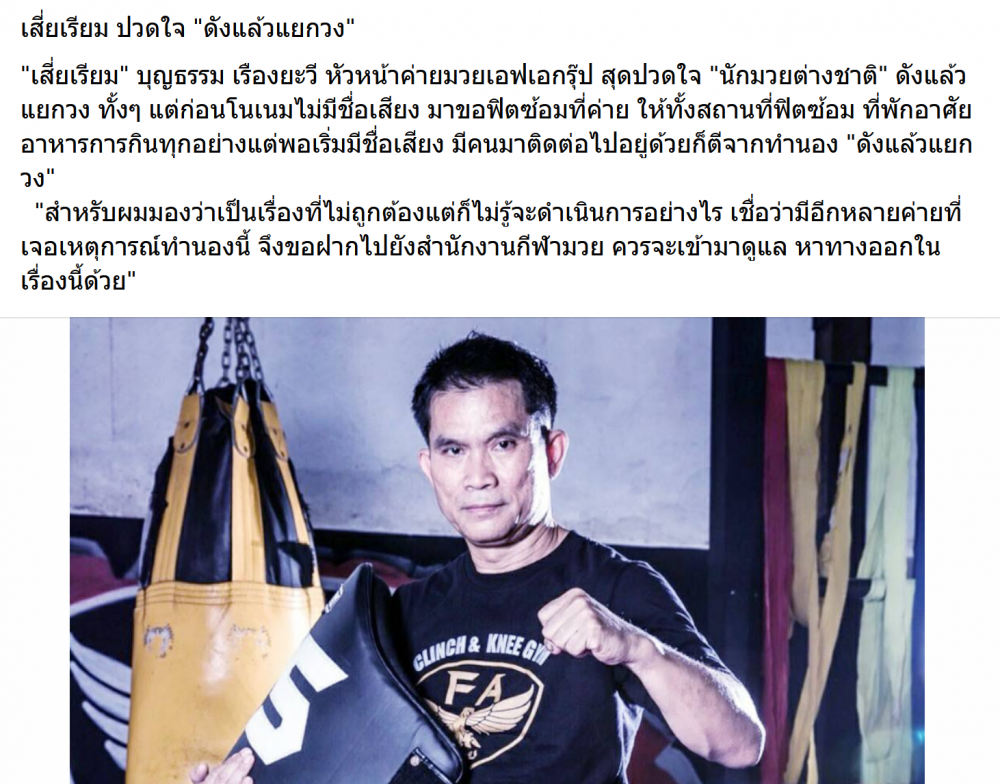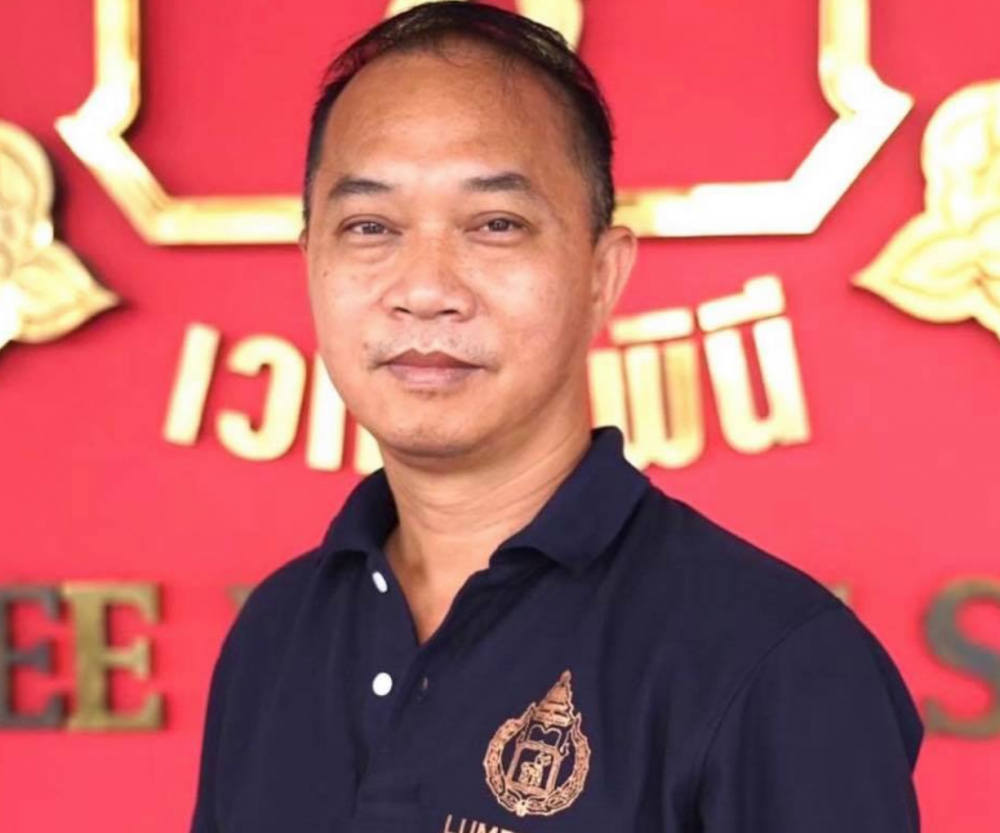Search the Community
Showing results for tags 'muay thai news'.
-
Thai language source This first time I've seen this issue publicly stated, Sylvie's paraphrase of the Thai news: "Sia Riam" the head of FA Group gym in Bangkok is quoted as being heartbroken by the pattern of international fighters coming to a gym and being welcomed with training, sleeping, eating as a group. They come with "no name" but after gaining some recognition or "fame" other gyms become interested and these fighters are swayed by promises elsewhere. He says he is sure other gyms have experienced this and asks for the Boxing Council to make a decision regarding the problem. (The issue being that Thai fighters are bound by contracts and a fighter changing gyms is a contracted sale, whereas non-Thai fighters have no legal contracts. His call maybe that gyms exercise more respect for another gym.) Opinion and Context This issue of farang gym loyalty in Thailand has been a long running one, wherein westerners seek to find traditional training experiences (and even traditional fight opportunities), but in the quest for authentic Thainess also find themselves outside of the structures of control which hold those traditional forms together. Thais largely are both legally contracted to the gym they train under, but also are often somewhat morally bound to the fatherly figures (or even motherly figures) in those gyms, which traditionally can be adoptive families. You'll recall, there was a very large Thai side dust up over this as Buakaw sought to extricate himself from his Por Pramuk contract which had been passed down from the gym's patriarch who died, to the owner's son. Buakaw was a world famous celebrity of fighting and did not feel still bound by his older, traditional contractual obligation, entered into when he was 9 years old. In the West this battle some years ago was largely portrayed as him breaking out of onerous workcamp ownership of Muay Thai, but in Thailand even though the contract he was under felt quite inequitable, some felt this public move was improper. He won his market freedom of movement. This was a rare, very public dispute. Unlike Thai fighters, Westerners on the other hand often found themselves in a hybrid, nebulous place. More traditional gyms that also were westerner-friendly like famous Sitmonchai or Sangtiennoi's gym gave a strong Thai family gym feel and experience, but westerners were not contractually bound to them. This contractless state is common throughout the country. Technically western fighters exist in a kind of psuedo-commercial arrangement, paying for training (and sometimes room and board), but also experiencing the closeness of family-style bonds that make Thailand's Muay Thai like no other Muay Thai in the world. This can become even more complicated if gyms extend "sponsorship" to a western fighter, providing room and board for exchange of fight percentage fees, and also an (unspoken) tightening of the sense of obligation, something a westerner may not fully feel because it isn't their culture. The western fighter may still remain mentally in the western idea of training wherein a "service" is being provided to them, which they pay for (either in monthly fees, or in terms of sponsorship with fight winnings), and in which they as the customer have ultimate choice and authority. For the Thai, they will see it shaded towards more traditional values and obligations. There is no ultimate "right" or even truth here, because each of these value systems are competing against each other, and are layered on each other somewhat simultaneously. But there is capacity for LOTS of miscommunication. One could romanticly attach oneself to the "traditional" model, but perhaps would also have to ignore the degree to which boys are contracted out at a very young age, often, becoming orphans in Muay Thai. There is harshness in the tradition. Or, one can see in the commercial arrangement where the customer is always right a highly impersonal, detached quid pro quo, the kind of which many come to Thailand to escape or be relieved from. Instead, in the past, westerners have found themselves often floating between the two, improvising respectful compromise and struggling through shared expectation. What seems to have changed at this point is I suspect the rise of Entertainment Muay Thai. Entertainment Muay Thai is a promotional style of Muay Thai that has become quite popular with tv audiences, and has given a shot in the arm to western-friendly gyms in Thailand. These televised fights had new rulesets that helped favor western fighters to win (forward aggression, shorter non-narrative rounds, reduced clinch, fought in a lower talent pool) and they drew a younger, more casual audience among Thais. Western friendly gyms suddenly had weekly televised promotions in which to showcase their fighters which not only grew the gym name, but also excited the fighters themselves. In the past a western fighter in a Thai gym largely would not be part of the serious business model of making stadium champions or sidebet stars. Instead they might compose a kind of side project, folding westerners into their Thai training. It varied between gyms just how integrated westerners would become, and some gyms would focus on them more than others, even promoting them, arranging belt fights with international organizations, etc., altering their business model to include more and more Muay Thai tourism. But, Entertainment Muay Thai seems to have done something interesting. It has raised the value of the western fighter, within the subculture itself. Gym names can become associated with Entertainment Muay Thai "stars" (promotions like ONE, Superchamp, Muay Hardcore, MAX), and with this rise in value is the absence of the traditional forms of control. The social bonds of fatherly or family control, or the legal bonds of contracts do not exist. What is really interesting about this FA Group statement is that both the shared family space of the gym, and the legal recourse of rules are referenced. It does not seem likely that this is in anyway to change right now, but as western fighters indeed do grow in value in the fight culture the lack of authority can produce conflicts and misunderstandings. It's also important to see that this issue is not just between a prospective fighter and their gym. It also, as its expressed, an issue between gyms themselves, the sense that other gyms can come in and poach the value in a western fighter that the prior gym has worked to build up. This is probably the even more serious issue. In the West we are much more used to thinking of things in terms of individual decisions and freedoms, and sometimes as difficulties between a person and an authority. But in Thailand its much more socially bound. Difficulties reflect power across the community in something of a triangle. This is because face is an important part of Thai culture. It's not just that a gym might lose a fighter of value (negative profit), its also the social consequences, the loss of status, that can happen when something appears to be taken from you. This is one aspect of how the contracting of fighters works. Contracts aren't just used to control the movements and opportunities of Thai fighters (they are of course, but they are more), they are also used to save face when fighters are leveraged to be moved, often beyond the control of the gym. The original gym gains compensation as a modicum of face. This is a pretty regular practice among smaller traditional Thai gyms that will find that their young star that they have built up locally, since a boy, is now being leveraged beyond their control by a powerful Bangkok gym. They have the contract, but perhaps the family of the boy sees much greater opportunity with the famous gym. The contract then gets sold, and a sign of face is given, even though the gym might not have an ultimate social say in the matter. This leveraging of built (youth) talent is what is being referenced here, but in the context of the built (adult) value of western fighters. If you want the latest in Muay Thai happenings sign up for our Muay Thai Bones Newsletter
-
see the Thai source here Sylvie paraphrases this announcement in Thai: Mr. Chai of GoSport announced that they will cancel all their Studio Saturday promotions (being produced in the Parking Structure next to Lumpinee Stadium), starting October 9th, 16th, and 23rd in order to spend that time rehearsing the "lights and sound" in the real Limpinee arena, ironing out some "timing issues" for a grand show on October 30th. He asks all fighters who had been scheduled to please keep training and be prepared for programs following from October 30th. No word whether the Giatpetch promotion, which precedes GoSport on Saturdays, will also be canceled or not. This is part of the evolving landscape of the New Lumpinee approach to Lumpinee Stadium, which involves intense commitment to producing promotions that have zero gambling influence, modernizing and Internationalizing its image, in this case the GoSport hybrid model of mixed cards with "Entertainment Muay Thai" type fights (3 round fights featuring farang vs Thai matchups) and also 5 round fights with a more traditional feel, coupled with the idea of an app that could give access to fights. GoSport which has been heading this movement had built a small green screen TV studio in the parking structure next to Lumpinee Stadium to be able to produce fights with the Lumpinee name under the Bangkok COVID prohibition of indoor events. Under this improvised solution they were able to put on the described "First Female Fight AT Lumpinee", making history. As the new promotion has been seeking its footing, overcoming a few early difficulties, this announcement anticipates that Thailand (and Bangkok) will be loosening up its restrictions at the end of the month. By shutting down their Saturday Studio shows which had featured their hybrid "modern" approach, they feel they can put on a more spectacular, tightly produced Grand Opening on October 30th, which will likely feature the first female fight IN the Lumpinee ring, the ring which historically had specific ritualistic prohibitions against anyone of the female gender entering its ropes, making history again. If you want the latest in Muay Thai happenings sign up for our Muay Thai Bones Newsletter
Footer title
This content can be configured within your theme settings in your ACP. You can add any HTML including images, paragraphs and lists.
Footer title
This content can be configured within your theme settings in your ACP. You can add any HTML including images, paragraphs and lists.
Footer title
This content can be configured within your theme settings in your ACP. You can add any HTML including images, paragraphs and lists.


